| Srl | Item |
| 1 |
ID:
161068
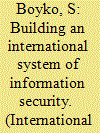

|
|
|
|
|
| Summary/Abstract |
THE BASIC PRINCIPLES for the State Policy of the Russian Federation in the field of International Information Security for the Period until 2020, which were approved by the Russian president on July 24, 2013,1 t clearly state the objective of Russia's policy on international information security - to help develop an international legal regime to underlie such a system.
|
|
|
|
|
|
|
|
|
|
|
|
|
|
|
|
| 2 |
ID:
162815
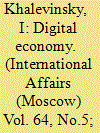

|
|
|
|
|
| Summary/Abstract |
TECHNOLOGY is moving ahead at a blistering and accelerating pace. To remain competitive in today's digitized world, one needs not only to master new technologies but also to be able to detect them at their emergence. Digitization of all forms of social relations is one of the most obvious global trends. Traditional products and services become digitized, with software, computing resources and information and communication networks being increasingly sophisticated and methods of processing, storage, transmission, and protection of information being increasingly efficient.
|
|
|
|
|
|
|
|
|
|
|
|
|
|
|
|
| 3 |
ID:
183997
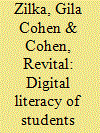

|
|
|
|
|
| Summary/Abstract |
Most academic campuses in Israel are multicultural, with a diverse composition of students. Using a mixed-method, mostly quantitative approach, this article examines the extent to which students’ cultural backgrounds affect their level of digital literacy. The findings show that students in two groups perceived digital learning differently across all seven factors examined: digital information processing and presentation; evaluation of information from the network; data collection and retrieval from the net; digital information management; communication and teamwork; awareness of integrity and ethical standards; and social responsibility. Ultra-Orthodox students perceived the digital environment as a means that enabled them to study, access course sites, and submit assignments. By contrast, students from the general population, with full access to digital environments, perceived access to information and communication technology (ICT) as an end in itself. Accepting cultural differences and different worldviews, will grant students equal opportunities, social mobility, and successful completion of studies.
|
|
|
|
|
|
|
|
|
|
|
|
|
|
|
|
| 4 |
ID:
182917
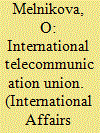

|
|
|
|
|
| Summary/Abstract |
RAPIDLY developing, increasingly sophisticated information and communication technologies (ICTs) have not only transformed human space, making it limitless, but also changed the system of international relations...
|
|
|
|
|
|
|
|
|
|
|
|
|
|
|
|
| 5 |
ID:
162806
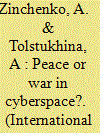

|
|
|
|
|
| Summary/Abstract |
INFORMATION and communication technology (ICT) plays an unprecedented role in today's world, but cyberspace is clearly lacking in security mechanisms that can guarantee stable and sustained world development.
|
|
|
|
|
|
|
|
|
|
|
|
|
|
|
|
| 6 |
ID:
177535
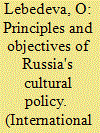

|
|
|
|
|
| Summary/Abstract |
A STUDY of the cultural policy of a country should involve studying the connection of the cultural life of that country with the political strategy of its government. Undoubtedly, the political course of a country is seriously affected by sociocultural factors that have evolved historically.
|
|
|
|
|
|
|
|
|
|
|
|
|
|
|
|
| 7 |
ID:
155354
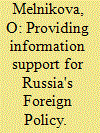

|
|
|
|
|
| Summary/Abstract |
IN ANY COUNTRY, including Russia, the efficiency of government depends to a serious extent on the quality of information support. An effective mechanism of government is impossible to imagine without media support for all aspects of home and foreign policy. The quantity, quality and accessibility of information are criteria for the external assessment of a state and indications of its status in the international community.
|
|
|
|
|
|
|
|
|
|
|
|
|
|
|
|
| 8 |
ID:
155355
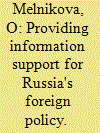

|
|
|
|
|
| Summary/Abstract |
IN ANY COUNTRY, including Russia, the efficiency of government depends to a serious extent on the quality of information support. An effective mechanism of government is impossible to imagine without media support for all aspects of home and foreign policy. The quantity, quality and accessibility of information are criteria for the external assessment of a state and indications of its status in the international community.
|
|
|
|
|
|
|
|
|
|
|
|
|
|
|
|
| 9 |
ID:
182916
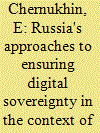

|
|
|
|
|
| Summary/Abstract |
IN TODAY'S world, preserving digital sovereignty is not only an immutable basis but also a guarantee of the existence of a state itself - a means of avoiding potential conflicts in the information environment. Russian President Vladimir Putin, speaking in March 2021 at a meeting of Russia's Security Council, where the [document] Fundamentals of Russian State Policy in the Field of International Information Security was being considered, stressed, in particular, that "Russia stands for the inviolability of the digital sovereignty of all states.... This means that each country can independently determine the regulatory parameters of its own information space and corresponding infrastructure."...
|
|
|
|
|
|
|
|
|
|
|
|
|
|
|
|
| 10 |
ID:
118135
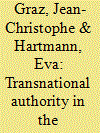

|
|
|
|
|
| Publication |
2012.
|
| Summary/Abstract |
This article examines the extent and limits of nonstate forms of authority in international relations. It analyzes how the information and communication technology (ICT) infrastructure for the tradability of services in a global knowledge-based economy relies on informal regulatory practices for the adjustment of ICT-related skills. By focusing on the challenge that highly volatile and short-lived cycles of demands for this type of knowledge pose for ensuring the right qualification of the labor force, the article explores how companies and associations provide training and certification programs as part of a growing market for educational services setting their own standards. The existing literature on non-conventional forms of authority in the global political economy has emphasized that the consent of actors, subject to informal rules and some form of state support, remains crucial for the effectiveness of those new forms of power. However, analyses based on a limited sample of actors tend toward a narrow understanding of the issues concerned and fail to fully explore the differentiated space in which nonstate authority is emerging. This article develops a three-dimensional analytical framework that brings together the scope of the issues involved, the range of nonstate actors concerned, and the spatial scope of their authority. The empirical findings highlight the limits of these new forms of nonstate authority and shed light on the role of the state and international governmental organizations in this new context.
|
|
|
|
|
|
|
|
|
|
|
|
|
|
|
|